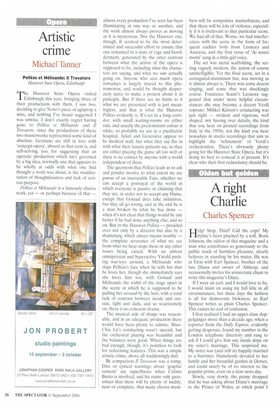Artistic crime
Michael Tanner
PeIleas at Milisande; II Trovatore Hanover State Opera, Edinburgh
The Hanover State Opera visited Edinburgh this year, bringing three of their productions with them. I saw two, deciding to give Nono's piece of agitprop a miss, and nothing I've heard suggested I was unwise. I don't exactly regret having gone to Pelleas et Maisande and II Trovatore, since the productions of these two masterworks represented some kind of absolute. Germans are still in love with 'concept-opera', absurd as that term is, and self-serving, too, for suggesting that an operatic production which isn't governed by a big idea, normally one that appears to be wholly at odds with what one had thought a work was about, is the manifestation of thoughtlessness and lack of serious purpose.
Pelleas et Mehsande is a famously elusive work, yet — or perhaps because of that — almost every production I've seen has been illuminating in one way or another, and the work almost always proves as moving as it is mysterious. Not the Hanover one, though. It seemed to be the most determined and successful effort to ensure that one remained in a state of rage and bewilderment, generated by the utter contrast between what the action of the opera is supposed to be, including what the characters are saying, and what we saw actually going on. Anyone who sees much opera nowadays is largely inured to this phenomenon, and would be thought desperately naive to make a protest about it in principle. But if there are no limits to it what we are presented with is just meaningless, and that is what the Hanover Pelleas evidently is. It's set in a long corridor, with small waiting-rooms on either side, and usually the predominant colour is white, so probably we are in a psychiatric hospital. Arkel and Genevieve appear to be medical staff, but what they say fits in with what their lunatic patients say, so they are either playing the game all too well or there is no contact by anyone with a world independent of them.
The questions that Pelleas leads us to ask and ponder involve to what extent we are pawns of an inscrutable Fate, whether we can accept a portrayal of the world in which everyone is passive or claiming that they are, in order not to accept any blame, except that Golaud does take initiatives, but they all go wrong, and at the end he is a man broken by what he has done — when it's not clear that things would be any better if he had done anything else; and so on. But in the Hanover Pelleas — presided over not only by a director but also by a dramaturg, which always means trouble — the complete severance of what we see from what we hear stops these or any other issues being raised. With an almost omnipresent and hyperactive Yniold pushing war-toys around, a Melisande who slaps Pelleas's face when he tells her that he loves her, though she immediately says she loves him too, with Golaud and Melisande the width of the stage apart in the scene in which he is supposed to be pulling her around by the hair, with a total lack of contrast between inside and outside, light and dark, and so wearisomely on, there is no coherent drama.
The musical side of things was reasonable, and in an adequate production there would have been plenty to admire. ShaoChia Lii's conducting wasn't special, but the orchestral playing was beautiful and the balances were good. When things are bad enough, though, it's pointless to look for redeeming features. This was a simple artistic crime, above all maddeningly dull.
By comparison II Trovatore was a romp. Dire or cynical warnings about 'graphic content' are superfluous when Calixto Bieito is involved, and his name only guarantees that there will be plenty of nudity, near or complete, that many chorus mem
bers will be compulsive masturbators, and that there will be lots of violence, especially if it is irrelevant to that particular scene. We had all of that. Worse, we had interferences with the score in the form of frequent cackles both from Leonora and Azucena, and the first verse of 'Ai nostri monti' sung in a little-girl voice.
The set was metal scaffolding, the setting vaguely modern, the action of course unintelligible. Yet the final scene, set in a corrugated-aluminium hut, was moving as it almost always is. There was some decent singing, and some that was shockingly coarse. Francesca Scaini's Leonora suggested that under more helpful circumstances she may become a decent Verdi soprano. Mihkel Kiltson's conducting was just right — strident and vigorous, well shaped, not fussing over details, the kind that you hear on pirated recordings from Italy in the 1950s; not the kind you hear nowadays in studio recordings that aim to highlight the 'refinement' of Verdi's orchestration. There's obviously plenty going for the Hanover State Opera, but it's doing its best to conceal it at present. It's clear who their first redundancy should be.










































































 Previous page
Previous page